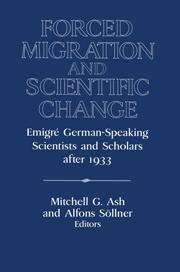Book contents
- Frontmatter
- Introduction: Forced Migration and Scientific Change after 1933
- PART ONE PHYSICAL AND MEDICAL SCIENCES
- PART TWO PSYCHOLOGY, PSYCHONALYSIS, PEDAGOGY
- PART THREE SOCIAL SCIENCES
- 8 Dismissal and Emigration of German-Speaking Economists after 1933
- 9 Emigration of Social Scientists' Schools from Austria
- 10 The Vienna Circle in the United States and Empirical Research Methods in Sociology
- 11 From Public Law to Political Science? The Emigration of German Scholars after 1933 and Their Influence on the Transformation of a Discipline
- Epilogue: The Refugee Scholar in America: The Case of Paul Tillich
- Index
11 - From Public Law to Political Science? The Emigration of German Scholars after 1933 and Their Influence on the Transformation of a Discipline
Published online by Cambridge University Press: 05 January 2013
- Frontmatter
- Introduction: Forced Migration and Scientific Change after 1933
- PART ONE PHYSICAL AND MEDICAL SCIENCES
- PART TWO PSYCHOLOGY, PSYCHONALYSIS, PEDAGOGY
- PART THREE SOCIAL SCIENCES
- 8 Dismissal and Emigration of German-Speaking Economists after 1933
- 9 Emigration of Social Scientists' Schools from Austria
- 10 The Vienna Circle in the United States and Empirical Research Methods in Sociology
- 11 From Public Law to Political Science? The Emigration of German Scholars after 1933 and Their Influence on the Transformation of a Discipline
- Epilogue: The Refugee Scholar in America: The Case of Paul Tillich
- Index
Summary
In this chapter, I will first sketch an outline of a topic that has as yet never been investigated in its entirety: the emigration of German political scientists (Staats- und Politikwissenschaftler) after the Nazis came to power. Although it may seem surprising that this topic has been neglected since several of the most prominent and interesting academic émigrés belong to this group, the reasons for this omission are easy to identify. We are dealing with a field of academic emigration in which one is from the very beginning confronted with the full complexity inherent in the application of the concept of acculturation to the history of disciplines. Even the German term Staatsund Politikwissenschaft represents a dubious compromise, and is a mere makeshift solution to the problem that Staatswissenschaft, as it existed in the Weimar Republic, can by no means be translated simply into “political science.” Furthermore, there is no guarantee that it is even possible to construct a unified, clear social or institutional history of this discipline, whatever its name may be, not least because politics, which follows a logic of its own, persistently intervenes. In short, a point that applies to the most recent research, especially insofar as it is inspired by the International Biographical Dictionary of Central European émigrés, 1933-1945, will probably become an even greater problem for political science - every quantitative method, no matter how refined it might be, is doomed to failure unless it is accompanied by intense qualitative analysis of the group being studied.
- Type
- Chapter
- Information
- Forced Migration and Scientific ChangeEmigré German-Speaking Scientists and Scholars after 1933, pp. 246 - 272Publisher: Cambridge University PressPrint publication year: 1996
- 1
- Cited by

